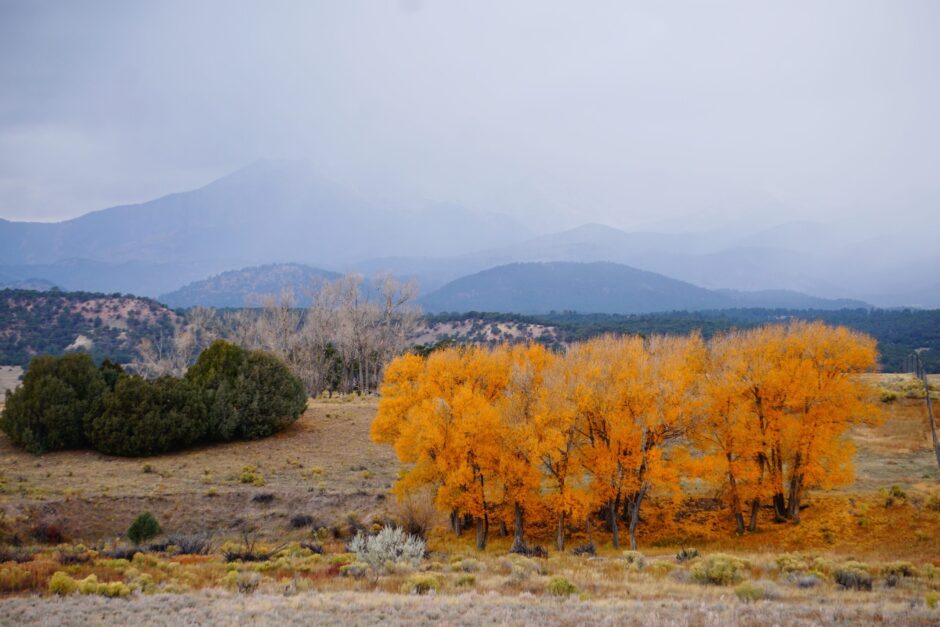So one thing I’ve noticed the last few years in my peripatetic life of inhabiting both the Eastern and the Western U.S. is a noticeable division in attitudes about Climate Change. In a nutshell, it seems as though the West is much more aware (and fearful of the consequences) of Climate Change, and the East sees it as more theoretical, as something happening elsewhere. There are good reasons for this divide, especially if you’re seeing it through the landscape prism of the Southwest—an area which some climatologists claim has warmed more dramatically than the rest of the country. I’ll leave actual figures for much more data-heavy sites than mine, but the website http://www.realclimate.org/ is a good source for such info. But here’s a bit of anecdotal evidence that says much: My home in Colorado is at the foot of an abandoned ski resort, that flourished briefly in the 1980s, which the locals also claim was a turning point in how much winter snow our area receives: In the past the mountains were regularly snow-clad from November to May, and now it’s an iffy proposition. The ski resort closed from lack of enough snow, and lack of enough business.
There’s a piece in today’s NY Times about an initiative in Boulder, Colorado, to switch away from a traditional utility company, and create a ‘greener’ model, here: http://www.nytimes.com/2011/10/30/us/boulder-seeks-to-take-power-from-the-power-company.html?_r=1&hpw
In central Pennsylvania, where I spend eight months of my year, the main energy argument seems to be how fast we can allow natural gas companies to frack the landscape, and of course at what cost: Or at no cost, as our Republican governor, Corbett, has a no-taxation for natural gas industry policy, in the name of encouraging ‘business,’ or rewarding his campaign contributors. (Almost all other states tax natural gas producers.) Although we certainly have our green energy proponents, and experts, such as Penn State faculty member and climate change expert Richard Alley, the general attitude seems to place Climate Change somewhere on the likelihood of being struck by a comet. Certainly it seems an abstract argument, not a practical one, contrary to the way it is increasingly being perceived as an immediate issue in the West.
- October 2023
- September 2023
- September 2021
- April 2020
- September 2019
- May 2019
- August 2018
- February 2018
- January 2018
- October 2017
- August 2017
- June 2017
- May 2017
- March 2017
- February 2017
- November 2016
- October 2016
- May 2016
- April 2016
- March 2016
- February 2016
- January 2016
- November 2015
- October 2015
- September 2015
- June 2015
- May 2015
- April 2015
- March 2015
- December 2014
- September 2014
- August 2014
- May 2014
- March 2014
- February 2014
- January 2014
- December 2013
- November 2013
- October 2013
- September 2013
- August 2013
- July 2013
- June 2013
- May 2013
- April 2013
- March 2013
- February 2013
- January 2013
- December 2012
- November 2012
- October 2012
- September 2012
- August 2012
- July 2012
- June 2012
- May 2012
- April 2012
- March 2012
- February 2012
- January 2012
- December 2011
- November 2011
- October 2011
- September 2011
- August 2011
- July 2011
- June 2011
- May 2011
- April 2011
- March 2011
- February 2011
- January 2011
- December 2010
- November 2010
- October 2010
- September 2010
- August 2010
- July 2010
- June 2010
- May 2010
- April 2010
- March 2010
- February 2010
- January 2010
- December 2009
- November 2009
- October 2009
- September 2009
- August 2009
- July 2009
- June 2009
- May 2009
- April 2009
- March 2009
Recent Posts
- Aliens Among Us: Probing Hillbillies and Freaking Shut-ins, How Netflix’s “Encounters” and Hulu’s “No One Will Save You” Prep Us for the Coming Alien Apocalypse, Kind of
- My Life as a Bob Odenkirk Character: On How Watching Netflix’s Black Mirror episode “Joan Is Awful” Mimicked My Experience of Watching the AMC series Lucky Hank
- “Bobcats, Bobcats, Bobcats”: Animal Life and a Tribute to “Modern Family”
- “The North Water”: This Ain’t Your Daddy’s Moby Dick
- Day 25: On David Quammen's "Spillover": Terrific Book That Foretold Our Pandemic, Kind of
Recent Comments
No comments to show.
